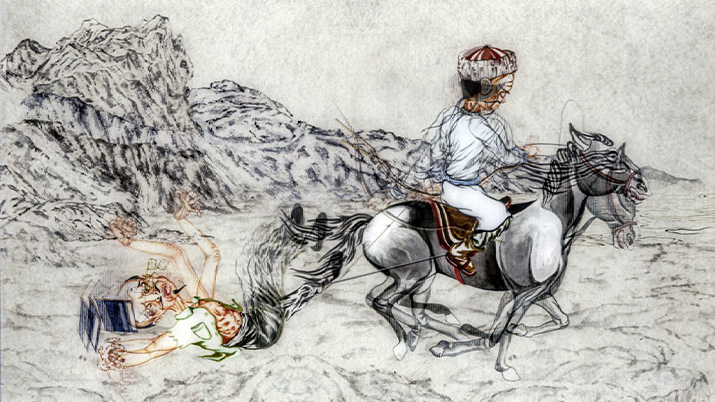The concept is addressed no longer by what it is, but by where it is situated or where it subsists – from ‘what is a concept’ to ‘where is a concept’
The Department of Art History Visual Art and Theory is pleased to announce the visit of Reza Negarestani to Vancouver this March. In the first of a series of events, Negarestani will be delivering a public lecture, Where the Concept Takes You, on Wednesday March 5 at 5:30pm, join our MFA seminar the following day, as well as conduct a further public lecture at Simon Fraser University, and participate as a keynote speaker at Incredible Machines: Digitality and the Modern System of Knowledge at the Threshold of the 21st Century, to be held at Access Gallery on Friday March 7 and Saturday March 8.
Reza Negarestani is a philosopher. He has contributed extensively to journals and anthologies and lectured at numerous international universities and institutes. His current philosophical project is focused on rationalist universalism beginning with the evolution of the modern system of knowledge and advancing toward contemporary philosophies of rationalism, their procedures as well as their demands for special forms of human conduct.
Negarestani’s book, Cyclonopedia, is frequently claimed as a key text in the fields of theory-fiction or new weird-fiction. It was judged one of the best books of 2009 by Artforum, a mark of the impact his work has begun to make upon the artworld in recent years, alongside numerous invitations to speak at galleries and museums, including the Miguel Abreu Gallery, The Guggenheim Museum, and the recent Escape Velocities symposium at e-flux in New York. His essay, “The Labor of the Inhuman, Part I: Human” is the lead article in the current issue of e-flux journal.
Where the Concept Takes You
From a formalist perspective, the concept is introduced as a space over which man has no hold. It is an epistemic cue in an otherwise qualitatively homogenous information space – a desert – for which no map and no compass is given. The gesture that constitutes the concept is a response to the question of localization (where to begin and how to proceed) in an environment where there is neither an a-priori determination of the initial place nor a given survey of the general landscape. In this situation, building extensive maps capable of holding the semantic load across different patches of the landscape leads to various epistemic complications. In order to avoid such complications, the concept is reformulated as a mobile frame, a transitory epistemic cue which procedurally informs its construction, extension and revision. But this reformulation amounts to a drastic shift in the ontology of the concept. The concept is addressed no longer by what it is, but by where it is situated (Leibniz) or where it subsists (Lawvere) – from ‘what is a concept’ to ‘where is a concept’. This presentation attempts to unpack the consequences of understanding the concept as a specific navigational abstraction of the local site or the place in terms of how such an abstraction brings into focus hidden cracks and defects in the classical portrait of concepts.
Weblinks:
For more information and registration for the Incredible Machines conference, (where Negarestani will be joined by Alexander R. Galloway, Suhail Malik, AHVA faculty members Jaleh Mansoor and T’ai Smith, and recent AHVA graduate students Ali Ahadi, Kate Henderson, Robin Simpson and conference organizer Mohammad Salemy, amongst others) please go to:
incredible-machines-2014
http://incrediblemachines.info/
“The Labor of the Inhuman” on e-flux
http://www.e-flux.com/journal/the-labor-of-the-inhuman-part-i-human/
“What is Philosophy” on Negarestani’s blog
http://blog.urbanomic.com/cyclon/archives/2014/01/philosophy.html#more
Reza Negarestani on Wikipedia
https://en.wikipedia.org/wiki/Reza_Negarestani

